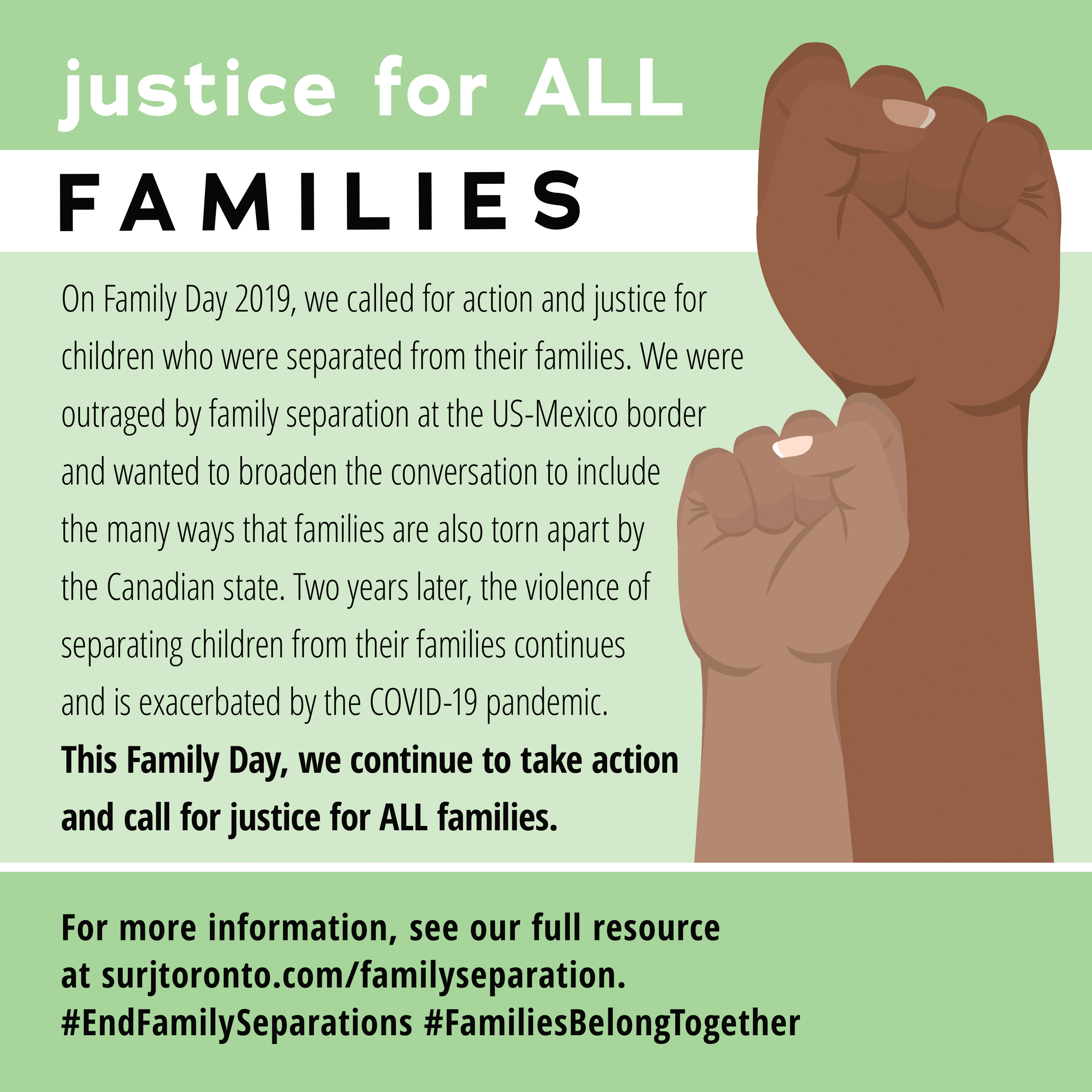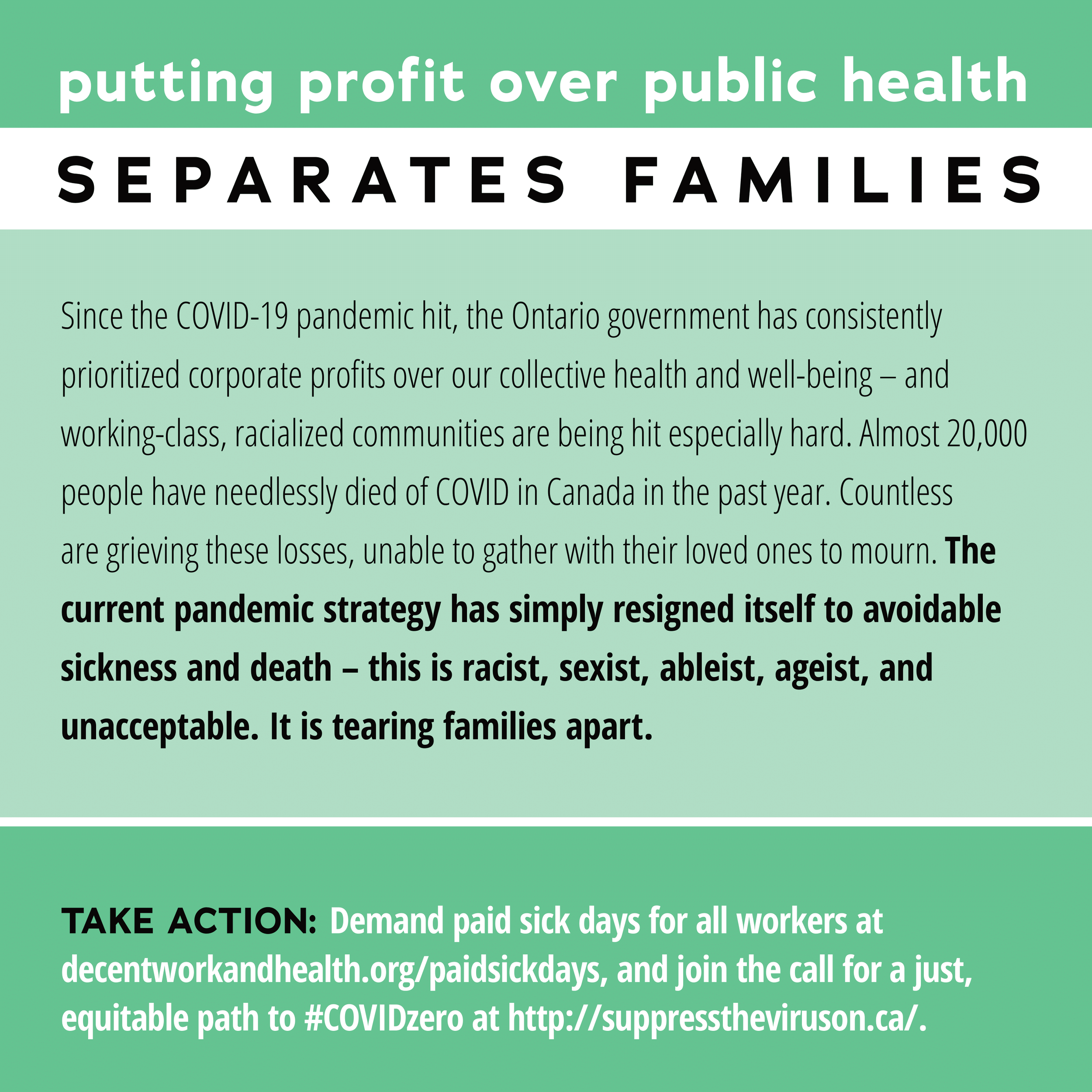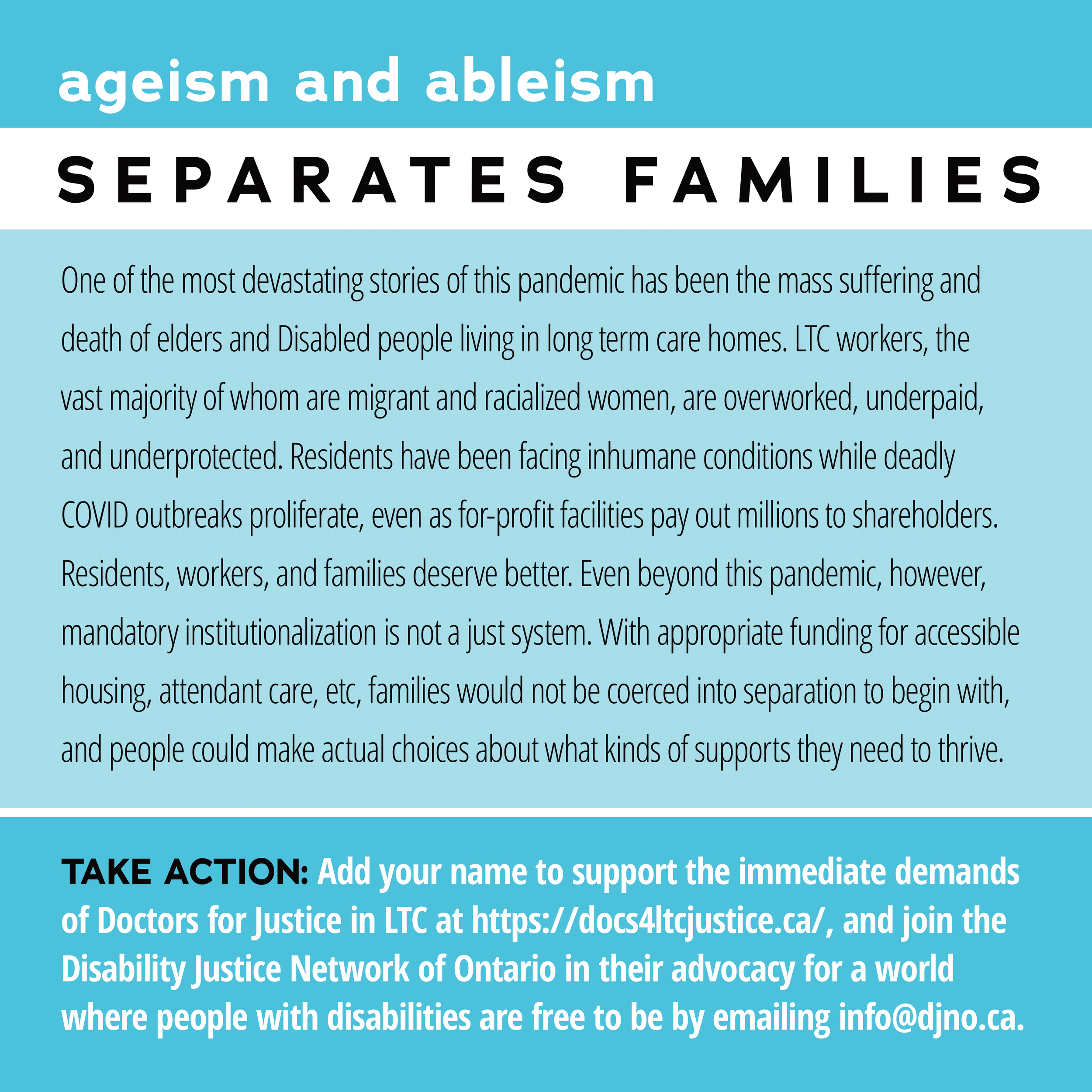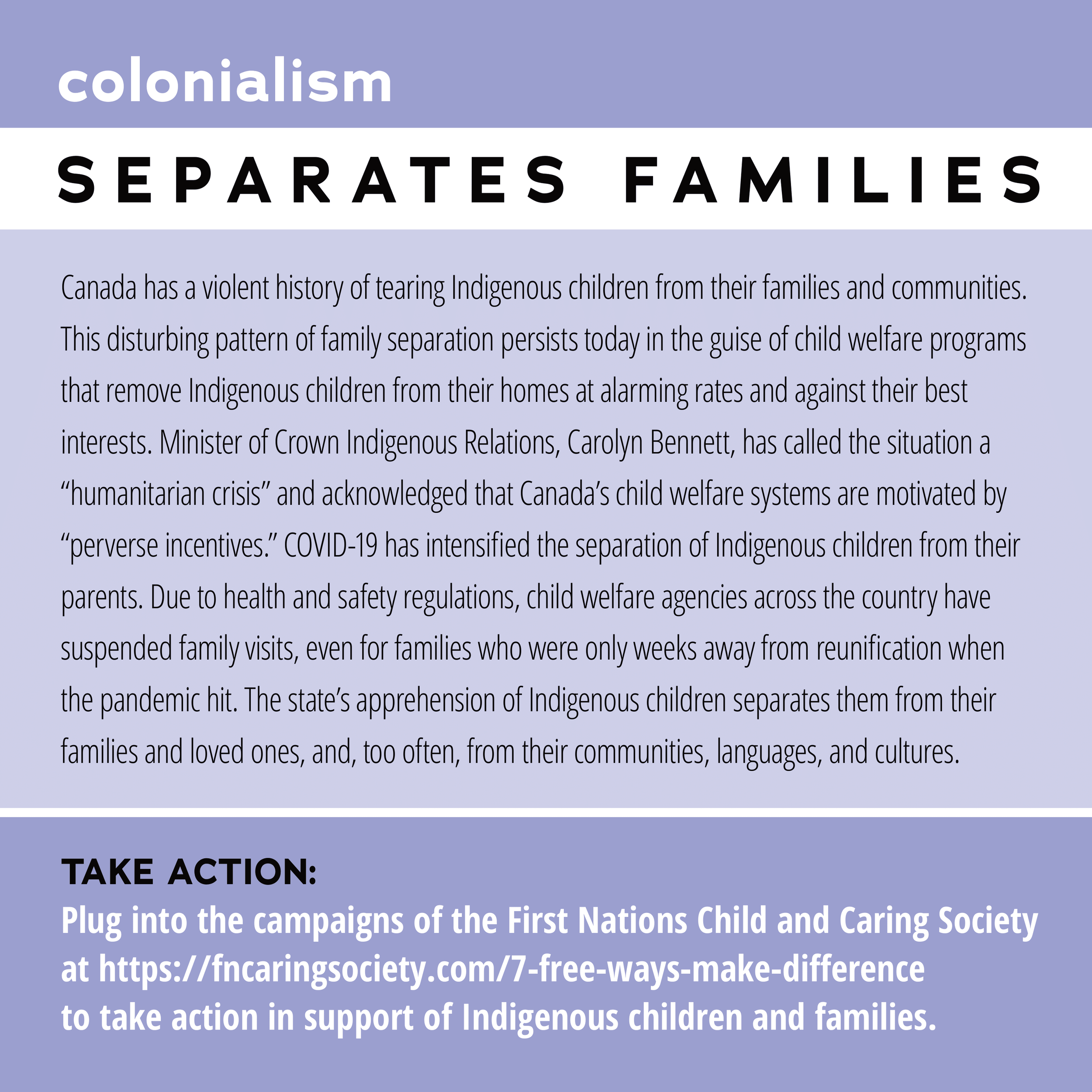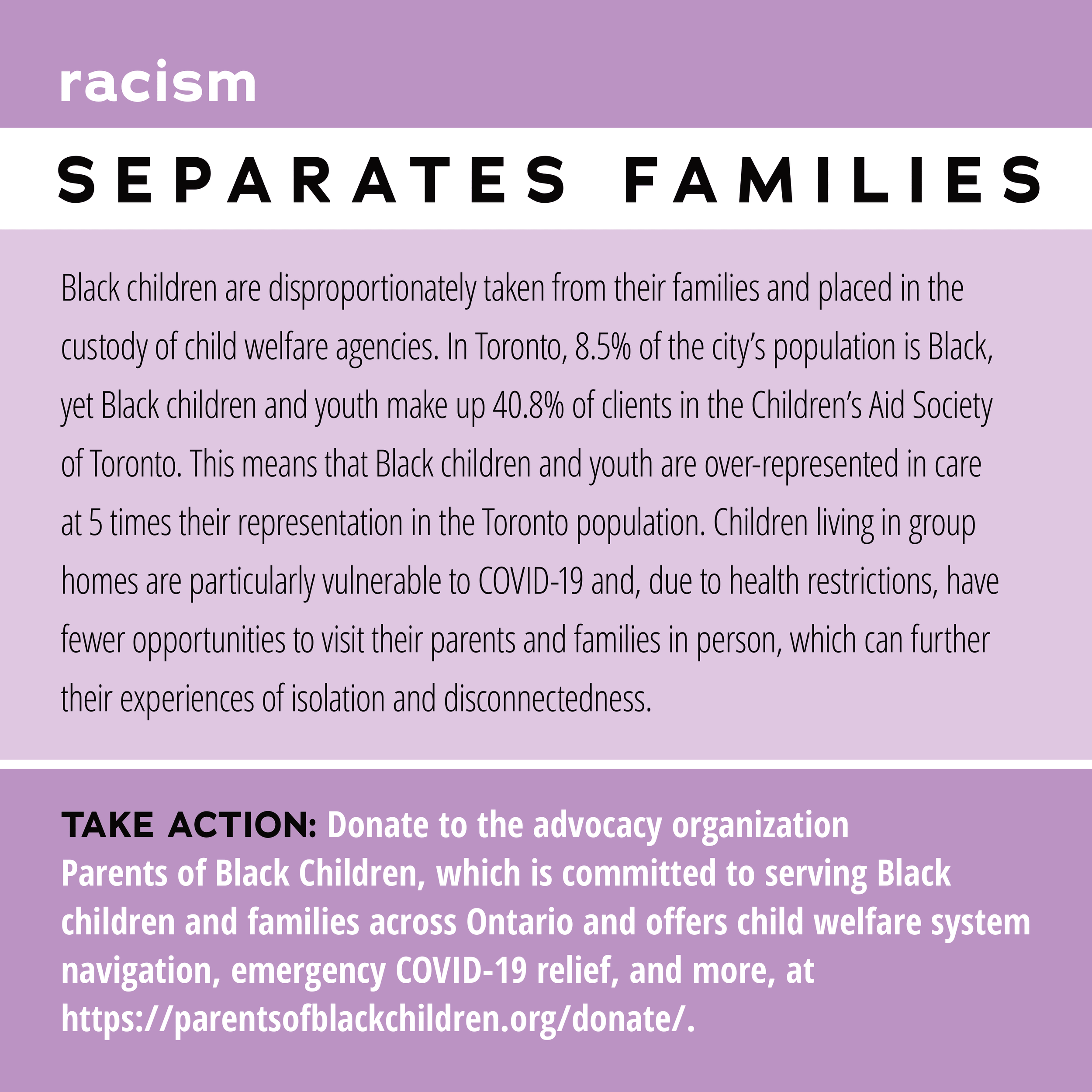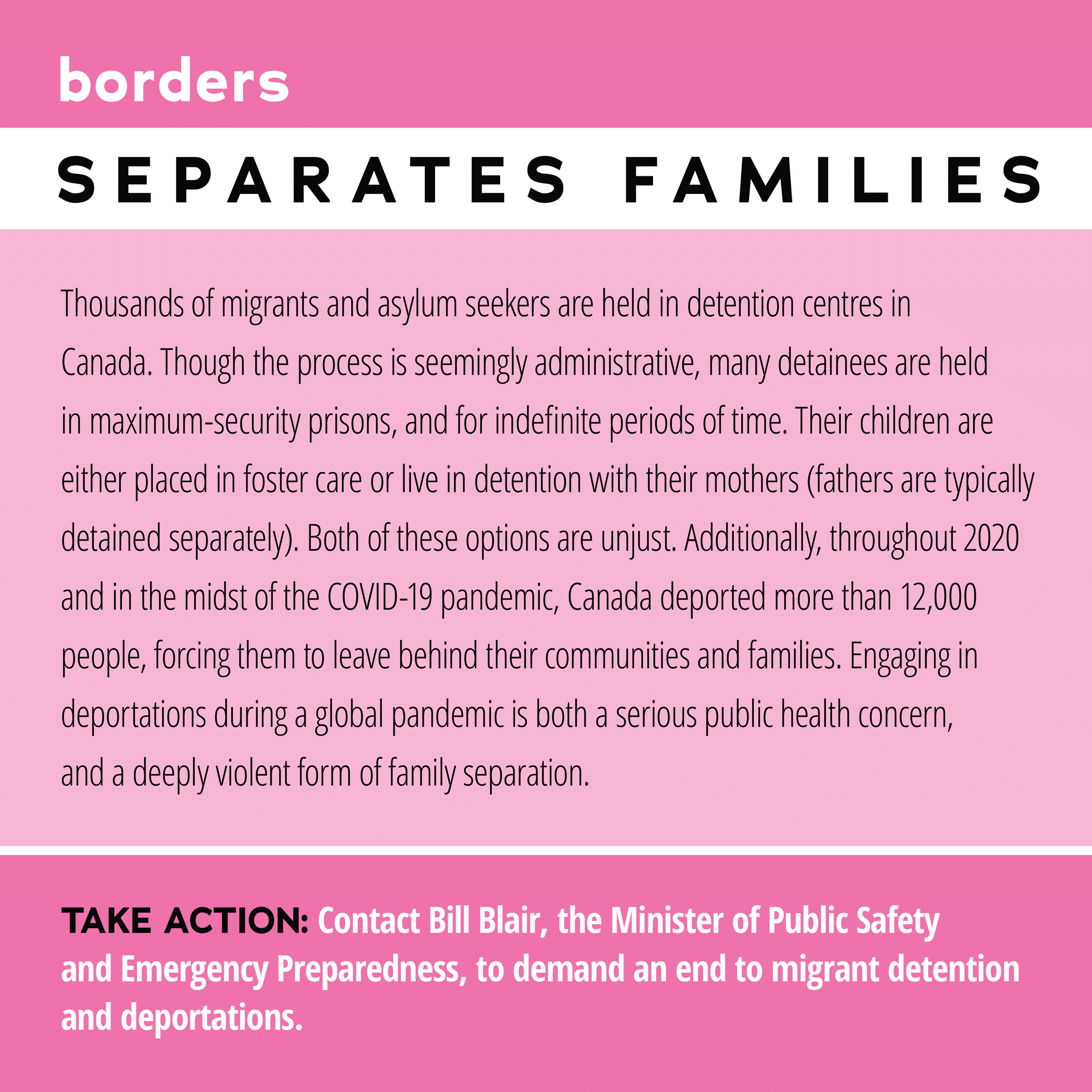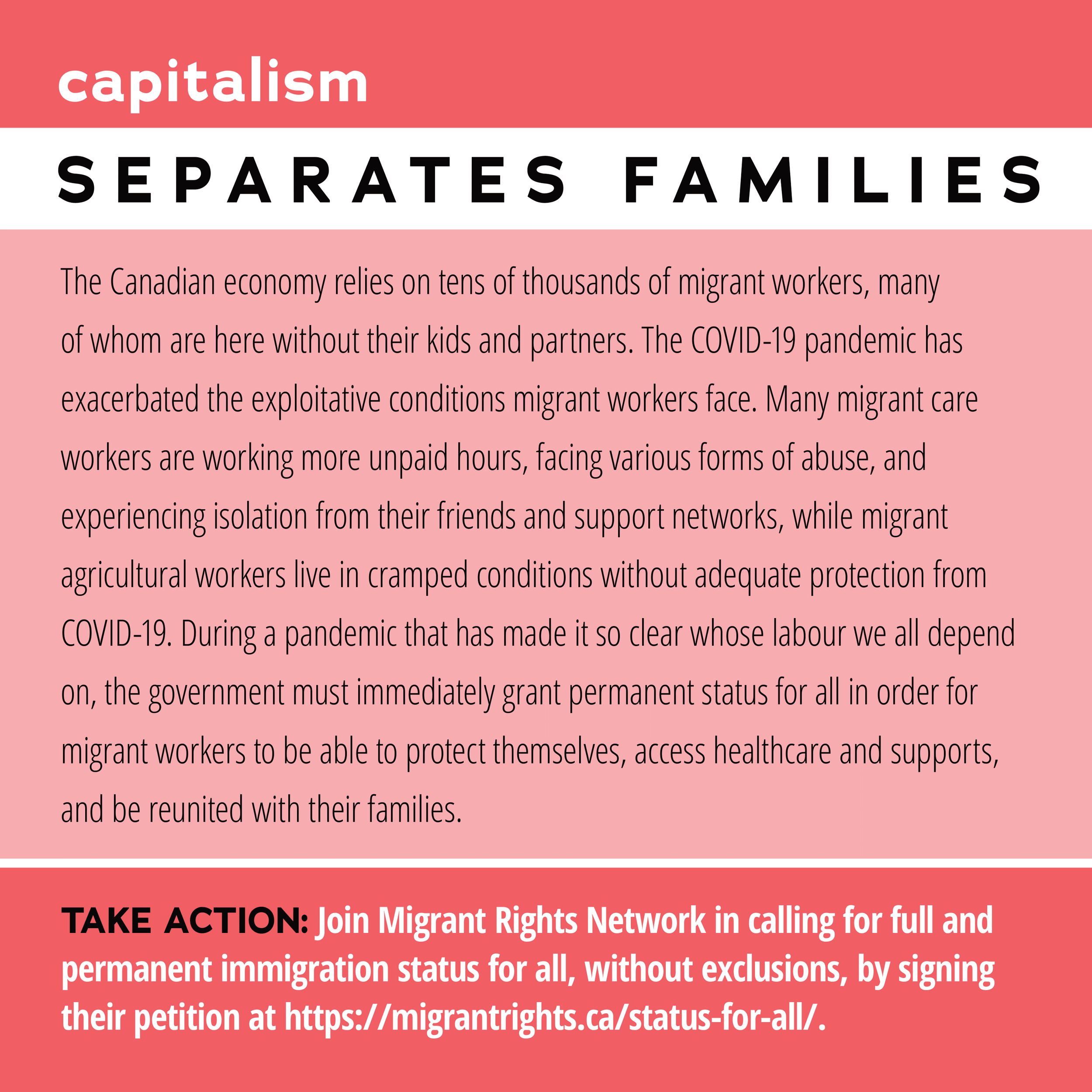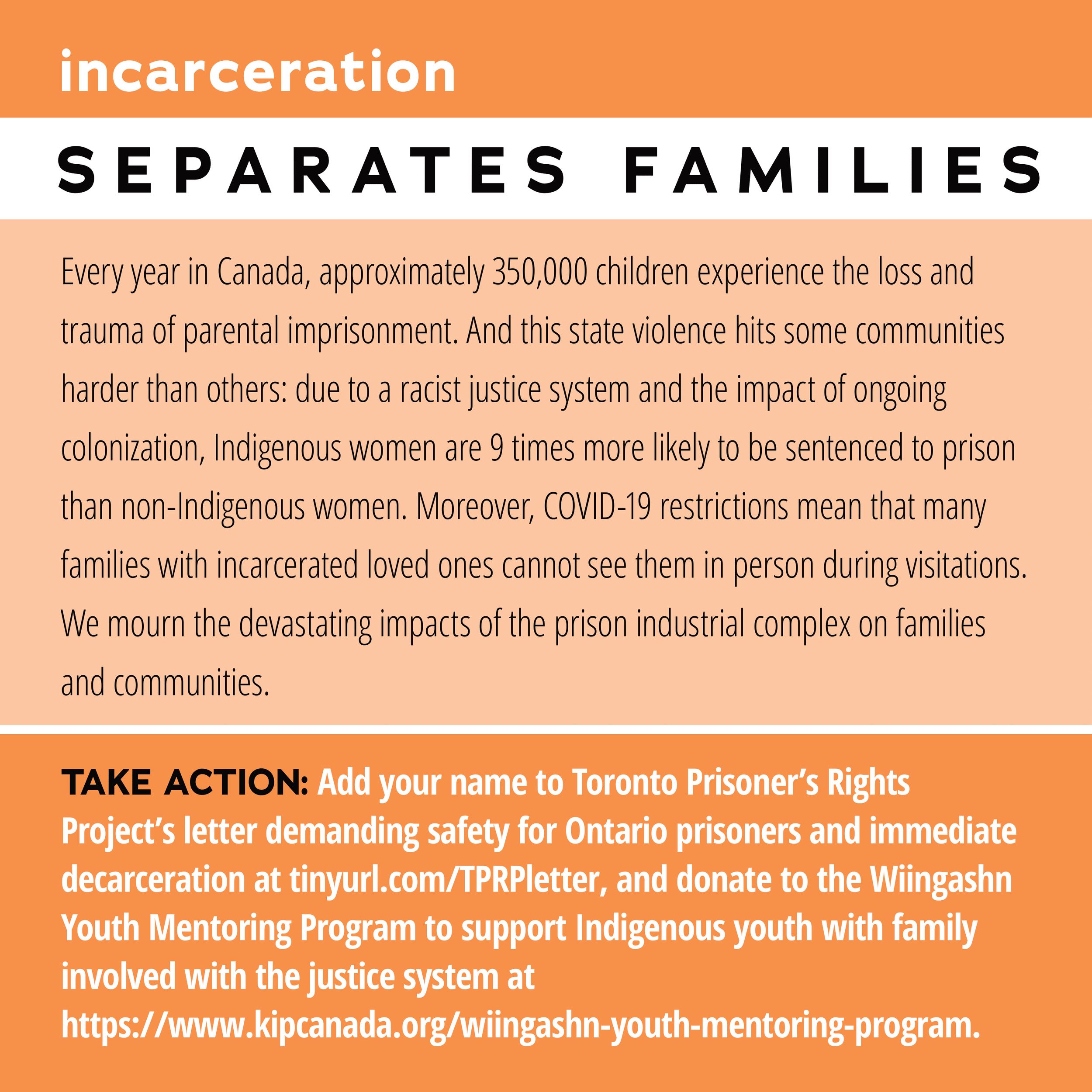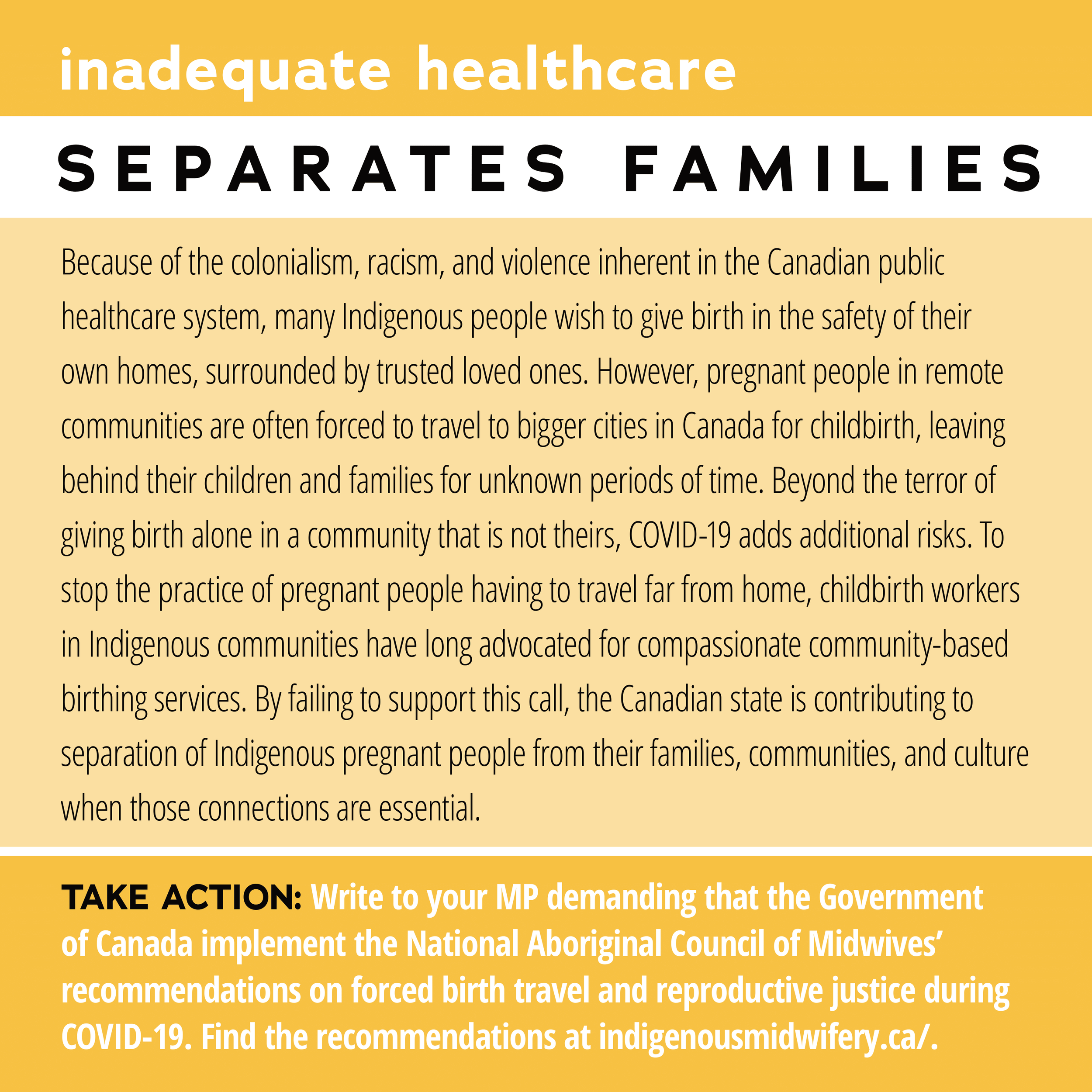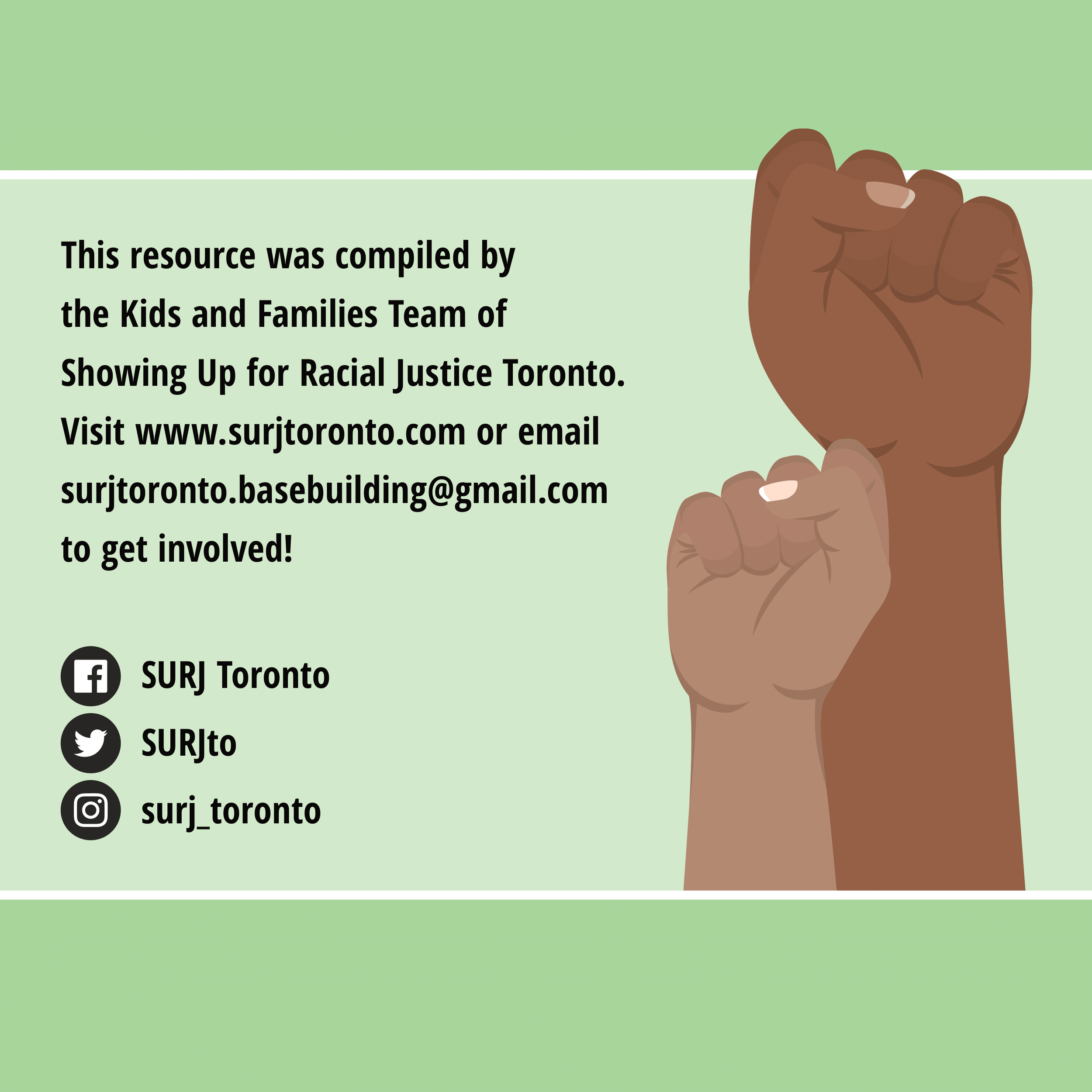Family Separation in Canada: A Resource and a Call to Action
Compiled by the Kids and Families Team of SURJ Toronto on Family Day, February 15, 2021
2022 update: Since we released this resource, the Disability Justice Network of Ontario has launched a campaign to Abolish Long-Term Care! To learn more about deinstitutionalization and sign the petition, visit: https://www.djno.ca/abolish-ltc
Justice for ALL Families
On Family Day 2019, we released a resource that demanded action and justice for children who have been separated from their parents and torn from their families. We were outraged by the family separation taking place at the US-Mexico border and wanted to broaden the conversation by drawing attention to the many ways that families are also torn apart by the Canadian state.
Two years later, the violence of separating children from their families continues right here at home. Although the COVID-19 pandemic has exacerbated this violence, it has a longstanding and complex history within Canada. Many structures, policies and practices of the Canadian state have long driven multiple forms of family separation, particularly for Indigenous, Black, migrant, and racialized families.
This Family Day, we take action and call for justice for ALL families.
#endfamilyseparations #familiesbelongtogether
Contents
Putting Profit over Public Health Separates Families
Ageism and Ableism Separates Families
Borders Separate Families
Colonialism Separates Families
Capitalism Separates Families
Racism Separates Families
Incarceration Separates Families
Inadequate Healthcare Separates Families
Putting Profit over Public Health Separates Families
Since the COVID-19 pandemic hit, the Ontario government has consistently prioritized corporate profits over the health and well-being of our communities. This approach has led to the needless death of elderly people and those living and working in long term care; of our Disabled, chronically ill, and immunocompromised loved ones; of the Black, migrant, and racialized communities who have borne the brunt of COVID-19 infections in the GTA; of our underhoused, precariously housed and homeless neighbours; of Indigenous people in Toronto and across the country; of incarcerated and formerly incarcerated community members; and of the healthcare and other essential workers who are on the frontlines. Over 20,000 people have died of COVID in Canada in the past year. Countless are grieving these losses, unable to even gather with their loved ones to mourn. The current pandemic strategy has simply resigned itself to avoidable sickness and death – this is racist, sexist, ableist, ageist, and unacceptable. It is tearing families apart.
Policing, threats, and rhetoric that blames individuals for systemic failures and conditions outside of their control are neither effective nor ethical tactics to deal with this pandemic. Instead, we must turn to principles of solidarity and community care, and toward robust, expansive, and inclusive social supports so that we can all make it through this crisis. We need decisive lockdowns to be accompanied by accessible income supports for people and small businesses, an eviction ban and comprehensive rent cancellation, PPE, and paid sick days for all workers, status for all migrants, an actual plan for vaccine rollout, strategies to test, trace, isolate, and support people who get sick, and more. We need to get to COVID-zero before more lives are lost.
Take Action:
To protect the most vulnerable workers and to help curb the spread of COVID, take action today to demand at least seven employer-paid sick days for all workers on a permanent basis, plus an additional 14 paid sick days during public health emergencies, and and join the call for a just, equitable path to #COIVDzero with the Suppress The Virus Now Coalition.
Learn More:
Read about the urgent need to get to #COVIDZero
Dig deeper into the need for a just recovery with the e-book, Sick of the System: Why COVID recovery must be revolutionary
Listen to the Sandy and Nora podcast on government failure to address the pandemic
Putting Profit over Public Health Separates Families
Since the COVID-19 pandemic hit, the Ontario government has consistently prioritized corporate profits over the health and well-being of our communities. This approach has led to the needless death of elderly people and those living and working in long term care; of our Disabled, chronically ill, and immunocompromised loved ones; of the Black, migrant, and racialized communities who have borne the brunt of COVID-19 infections in the GTA; of our underhoused, precariously housed and homeless neighbours; of Indigenous people in Toronto and across the country; of incarcerated and formerly incarcerated community members; and of the healthcare and other essential workers who are on the frontlines. Over 20,000 people have died of COVID in Canada in the past year. Countless are grieving these losses, unable to even gather with their loved ones to mourn. The current pandemic strategy has simply resigned itself to avoidable sickness and death – this is racist, sexist, ableist, ageist, and unacceptable. It is tearing families apart.
Policing, threats, and rhetoric that blames individuals for systemic failures and conditions outside of their control are neither effective nor ethical tactics to deal with this pandemic. Instead, we must turn to principles of solidarity and community care, and toward robust, expansive, and inclusive social supports so that we can all make it through this crisis. We need decisive lockdowns to be accompanied by accessible income supports for people and small businesses, an eviction ban and comprehensive rent cancellation, PPE, and paid sick days for all workers, status for all migrants, an actual plan for vaccine rollout, strategies to test, trace, isolate, and support people who get sick, and more. We need to get to COVID-zero before more lives are lost.
Take Action:
To protect the most vulnerable workers and to help curb the spread of COVID, take action today to demand at least seven employer-paid sick days for all workers on a permanent basis, plus an additional 14 paid sick days during public health emergencies, and and join the call for a just, equitable path to #COIVDzero with the Suppress The Virus Now Coalition.
Learn More:
Read about the urgent need to get to #COVIDZero
Dig deeper into the need for a just recovery with the e-book, Sick of the System: Why COVID recovery must be revolutionary
Listen to the Sandy and Nora podcast on government failure to address the pandemic
Ageism and Ableism Separates Families
One of the most devastating stories of this pandemic has been the mass suffering and death of elders and disabled people living in long term care facilities. Underfunded and understaffed, many long term care homes are grappling with inhumane living and working conditions, while COVID outbreaks continue to spread and a LTC resident now dies of COVID in this province every hour. In Ontario, more than half of LTC homes are private, for-profit facilities, which saw 78% more COVID deaths compared with non-profit homes while paying out millions to their shareholders. LTC workers, the vast majority of whom are migrant and racialized women, are overworked, underpaid, underprotected, and forced to juggle shifts at multiple homes to make ends meet. They are facing the trauma and horror of this pandemic on a daily basis, and are getting sick and dying. Residents, workers, and families deserve better, and there have been powerful calls to nationalize long term care and end for-profit care homes in order to address this immediate crisis.
Disability Justice advocate Sarah Jama has, however, pointed out that the system of LTC and residential services homes widely relies on the ableist and ageist assumption that elderly and disabled people must be “sent away.” As the Disability Justice Network of Ontario has said, “There can be no #LTCJustice so long as people are forcibly confined”. With appropriate funding for accessible housing, attendant care, and additional essential supports, families would not be coerced into separation to begin with, and people could make actual choices about what kinds of supports they need to thrive.
Take Action:
Add your name to support the immediate demands of Doctors for Justice in LTC at https://docs4ltcjustice.ca/, and join the Disability Justice Network of Ontario in their advocacy for immediate vaccination and deinstitutionalization, and for a world where people with disabilities are free to be, by emailing info@djno.ca.
Learn More:
Read more here and here about the ableism behind the mandatory LTC model, and check out this important article by Megan Linton about the connections between incarceration and institutionalization, during and beyond the current pandemic
Check out this article on using a prison abolitionist model to abolish LTCs
Although American, this article offers the historical context of LTCs and an argument for their abolishment
Read Care Work: Dreaming Disability Justice by Leah Lakshmi Piepzna-Samarasinha, Decarcerating Disability by Liat Ben-Moshe, and Disability Incarcerated edited by Liat Ben-Moshe, Chris Chapman, and Alison Carey
Learn more about LTCs, the prison-industrial-complex and abolition from the National Lawyers Guild here
Borders Separate Families
Thousands of migrants are held in detention centres in Canada. Though their cases are non-criminal, many detainees are held in maximum-security prisons, and for indefinite periods of time. Canada is one of few countries that does not impose a maximum term for detentions; the UN has deemed this a violation of human rights.
Children of detainees are either placed in foster care or live in detention with their mothers (fathers are typically detained separately). The plight of these kids can’t be addressed in detention reviews, since the law does not acknowledge the existence of detainees who are minors. The alternative to detaining children is separating them from their detained parent(s). Both options are unjust.
Meanwhile, refugees seeking asylum in Canada are assessed individually, and often, children are granted asylum while their parents or siblings are denied. In these cases, parents must choose between leaving their children to state care in Canada, or subjecting them to the unsafe conditions they fled abroad. Appeals of these separations can be made only (and with difficulty) on a case-by-case basis; there is no official provision for keeping families, already fleeing persecution, together.
At the onset of the COVID-19 pandemic, Canada imposed a moratorium on deportations. The moratorium was lifted in November and recent data shows that 12,122 people, 875 more than the previous year, were deported from Canada in 2020. Engaging in deportations during a global pandemic is both a serious public health threat and a deeply unjust form of family separation.
Take Action:
To demand an end to migrant detention and deportations, contact Bill Blair, the Minister of Public Safety and Emergency Preparedness
Learn More:
Check out No One Is Illegal and their End Immigration Detention resources
Read the Toronto Star’s 2017 exposé of detention conditions, “Caged by Canada”
Take a peek at Neverhome.ca: a multimedia project that documents nine years of the federal government’s immigration changes.
Expand your knowledge on children’s experience with Asylum-Seeking Children's Experiences of Detention in Canada: A Qualitative Study
Colonialism Separates Families
Canada has a violent and ongoing legacy of removing Indigenous children from their families and communities. The residential school system forcibly separated an estimated 150,000 children from their homes for more than a century, with the last residential school closing just twenty-four years ago in 1996. For more than two decades, Indigenous children were also taken from their families and placed in non-Indigenous homes during what is now called the Sixties Scoop. The government programs meant not only a separation from loved ones, but a loss of vital connection to their communities, languages, and cultures.
This disturbing pattern of family separation persists today in the guise of child welfare programs that remove Indigenous children from their homes at alarming rates and against their best interests. According to the Canadian 2016 Census, Indigenous children account for nearly 52.2% of all children in foster care despite making up only 7.7% of the overall child population. This means that 14,970 out of 28,655 children under the age of 15 in private foster care homes are Indigenous. In Manitoba and Saskatchewan that number is nearly double, with Indigenous children accounting for nearly 90 percent of all children in foster care. Minister of Crown-Indigenous Relations Carolyn Bennett has called the situation a “humanitarian crisis” and acknowledged that Canada’s child welfare systems are motivated by “perverse incentives.” The state’s apprehension of Indigenous children is one of many systemic injustices whose intersection leaves Indigenous communities in distress and precipitates tragic crises, including epidemics of youth suicides.
COVID-19 has intensified the separation of Indigenous children from their parents. Due to health and safety regulations, child welfare agencies across the country have suspended family visits, even for families who were mere weeks away from reunification when the pandemic hit.
Child welfare agencies and lawyers argue that complying with COVID-19 regulations is in the “best interest” of the child, despite acknowledging the harm of long-term physical separation, particularly for infants who require physical contact to form attachment with their parents. Advocates fear that halting visits will derail parents’ custody battles, which operate on a tight timeline; after 12–18 months agencies can seek extended custody and children can be adopted. There is concern that long periods of separation can be used against parents in court to argue that they have not bonded with their children. More robust strategies are needed to ensure that the risks of COVID-19 transmission are balanced with the rights that Indigenous children have to remain meaningfully connected to their families, communities, and cultures.
Take Action:
The First Nations Child and Caring Society advocates for the rights of Indigenous children. Their work includes a successful Human Rights Tribunal case against the Attorney General regarding discriminatory child welfare practices. Plug into their campaigns to take action in support of Indigenous children and families.
Learn More:
Follow #notonemoreindigenouschild, The First Nations Child and Caring Society (@caringsociety) and Cindy Blackstock (@cblackst) on Twitter
Expand your knowledge on the impact of Canada’s child welfare system on Indigenous children with the National Collaborating Centre for Aboriginal Health’s overview here
Read Maclean’s 2018 exposé on Indigenous parents fighting against the colonial foster care system
Read more about the Stolen Generations on Chelsea Vowel’s blog, âpihtawikosisân
Watch Birth of a Family, Tasha’s Hubbard’s documentary about four Sixties Scoop survivors who reunite as a family
Read the Yellowhead Institute’s briefing on federal child welfare and Indigenous childhood sexual violence
Capitalism Separates Families
Canada’s labour market has seen a broadscale shift over the past two decades to an increased reliance on transnational migrant workers across all industries. While migrant workers come from all over the world to work in Canada, the majority are from the global south. Migrant workers are mostly employed in exploitative low-wage work, accepting positions as care workers in Canadian homes and as agricultural workers on Canadian farms. Migrant workers often come to Canada on time-limited work permits and hold precarious temporary immigration status, leaving them open to exploitation and abuse, and limiting their capacities to find decent and safe work. Most migrant workers come to Canada on closed work permits with a single employer; if they quit or are fired from their job they are not allowed to work elsewhere and lose whatever progress they have made toward obtaining permanent residency. Complaining about or leaving abusive work conditions is not only difficult, but often dangerous.
Under Canada’s Temporary Foreign Worker Program, many migrant workers must leave their children and partners in their home countries to secure employment here. The federal government’s new pilot programs were developed to provide pathways to permanent residency for both migrant agricultural and care workers, but are insufficient. After years of community organizing led by migrant care workers, Canada announced a new program in 2020 that would allow migrant care workers to come to the country with their families and make it easier for them to change jobs. But this program’s unfair language and educational requirements mean that many migrant care workers are shut out from the path toward acquiring permanent residency. Under the current system, live-in caregivers must work in Canada full-time for two years (or 3,900 hours) with one employer before they can apply for permanent residence. The Caregivers Action Centre says that it often takes another year after that for permanent residency to be granted, making it several years before migrant workers can even try to bring their families to Canada. Increased delays in the processing of permanent residency applications due to the pandemic means it will be even longer before migrant workers are reunited with their families from whom many have already spent years apart while caring for other children. The federal government has also announced a new Agri-Food Pilot program to offer a pathway to residency for agricultural workers with relevant experience and a non-seasonal job offer from a Canadian employer. However, like the Pilot Care Worker program, the language and education requirements are extensive and difficult for many migrant agricultural workers to meet.
The COVID-19 pandemic has exacerbated existing exploitative conditions, with many migrant workers working more unpaid hours.. Many migrant care workers have been barred by their employers from leaving the home they work and live at or from meeting with friends and partners. Similarly, many migrant agricultural workers have been barred from leaving farms or having visitors, while the same rules have not been applied to Canadian workers. COVID-19 has spread at full tilt through farms that employ migrant workers, fueled by unsanitary and inhumane living conditions and lack of systemic legal support. The heightened risk for migrant farm workers of contracting COVID-19 means that separated families are worried and fearful for each other’s lives. In their open letter Vaccines for All, Migrant Rights Network writes: “Migrant and undocumented people are at the forefront of the Covid-19 crisis. We are often working in essential jobs that sustain our communities but have been excluded from services and protections.”
Organizers assert that the government must immediately grant permanent residency for all so that migrant workers can protect themselves and be reunited with their families. Migrant workers also need free access to vaccines to protect them from contracting the virus.
Take Action:
Join Migrants Rights Network in calling for full and permanent immigration status for all by signing their petition. Sign their petition calling for free and accessible vaccines for all.
Learn More:
Read Behind Closed Doors: Exposing Migrant Care Worker Exploitation During COVID-19, a comprehensive report developed by numerous migrant rights organizations across Canada
Follow the Migrant Rights Network, an umbrella organization of migrant rights and migration justice groups across Canada, for up to date information on migrant Care Workers
Listen to Liberation Pedagogy Project’s podcast episode Harvesting Freedom for Migrant Workers from the Agricultural Industrial Complex
Check out recent news articles about the injustices migrant Care Workers face here, here and here
Racism Separates Families
Throughout Canada, Black children are disproportionately taken from their families and placed in the custody of child welfare agencies. In Toronto, 8.5% of the city’s population is Black, yet Black children and youth make up 40.8% of clients in the Children’s Aid Society of Toronto. This means that Black children and youth are over-represented in care at five times their representation in the Toronto population. Additionally, Black children and youth are 40% more likely to be investigated by child welfare than their white counterparts, with investigations often resulting in apprehension.
By removing Black children and youth from their families, children’s aid societies deny Black children familial, cultural, and kinship connections that are essential to their well-being. Anti-Black racism permeates Canada’s child welfare system and paints Black parents and families as inherently aggressive, criminal, and unfit to care for children. Black families are penalized for experiencing intergenerational trauma due to colonialism and enslavement, living in poverty, lacking access to social services, or simply not being aware of child protection laws and services. Rather than offer supports to preserve families, child welfare agencies prioritize child removal, reinforcing the physical, emotional, mental, and social consequences of systemic racism on Black families.
Life in care can be an incredibly isolating experience for children and youth, particularly Black children, as they are often disconnected from both their family and culture. This desolation and disconnectedness has been amplified during the COVID-19 pandemic, children living in group homes are particularly vulnerable to COVID-19 and, due to health restrictions, have fewer opportunities to visit their parents and families in person.
The Government of Ontario recently announced plans to redesign the province’s child welfare system with promises to focus on prevention, rather than apprehension, and to address the over-representation of Black and Indigenous children in the system. Part of the redesign includes an allocation of $650,000 to One Vision, One Voice, a community-led project that supports the delivery of culturally appropriate services for African-Canadian and Black children and youth in the child welfare system. Despite this funding, children’s rights advocates have expressed concern that the provincial redesign will not adequately centre affected communities, provide sufficient funding, or result in policy changes needed to provide adequate care to children and youth or to undermine the deeply entrenched racism inherent in Ontario’s child welfare system.
Take Action:
Donate to Parents of Black Children, who are committed to serving Black students and families across Ontario through child welfare system navigation and emergency COVID-19 relief.
Learn More:
Read ONE VISION ONE VOICE a comprehensive research report on anti-Black racism in Ontario child welfare
Take a look at this infographic on the disproportionate rates of Black children in the Ontario child welfare system
Listen to Safe Space’s 2018 podcast - When the Government Comes Knocking on your Door
Read Chapter Seven of Policing Black Lives by Robyn Maynard titled ‘Destroying Black Families: Slavery’s Afterlife in the Child Welfare System’
Incarceration Separates Families
Incarceration separates families every day. Every year in Canada, approximately 350,000 children experience the loss and trauma of parental imprisonment. And this state violence hits some communities harder than others. In Canada, Indigenous women make up 43% of women admitted into correctional facilities, while representing less than 5% of the Canadian adult population. This horrific overrepresentation is the result of racist policing and sentencing, but also, colonialism’s wider social impacts: state violence, colonial patriarchy, intergenerational trauma, rampant poverty, inadequate or inaccessible services and supports, and more. Research has shown that many of the charges Indigenous women face are driven by contexts of extreme poverty and often committed out of fear of state apprehension of their children.
Approximately two-thirds of women serving time in Canadian prisons are parents and primary caregivers for their children. Those who are pregnant while in custody are often separated from their infants at birth, and prevented from bonding with or nursing their newborns. This separation is devastating for parents and children alike, and can lead to loss of custody, either temporary or permanent. We see the connections between residential schools, the Sixties Scoop and the mass incarceration of Indigenous mothers, and we mourn the devastating impacts that incarceration has on families and communities.
The COVID-19 pandemic has exacerbated the trauma and devastation felt by families with incarcerated loved ones and worsened isolation for incarcerated parents. In some prisons, physical contact is prohibited during visitations and the number of visitors permitted has decreased, meaning that sometimes parents cannot see their children. Federal prisons in Québec and Manitoba have suspended vistations altogether. On top of visitation restrictions, incarcerated people also live with the fear of contracting COVID-19; there were over 1,000 positive cases reported in November and December alone.
At the onset of the pandemic, dozens of organizations called on the Canadian state to contain COVID, not people by releasing youth, immigrants, refugees, and individuals particularly vulnerable to COVID-19 from prison. The Canadian Association of Elizabeth Fry Societies issued a call to the Correctional Service of Canada specifically asking them to release women who pose little risk to the public in order to protect them from the virus. Provincial and territorial institutions answered this call by releasing 25% of their prison population (6,000 people), while federal institutions only reduced their numbers by 1%. Provincial, territorial, and federal institutions must do more to decarcerate prisons, not only because of the risks posed by COVID-19, but also because the carceral system is inherently violent, colonial, and unjust.
Take Action:
Add your name to Toronto Prisoner’s Rights Project’s letter demanding safety for Ontario prisoners and immediate decarceration at tinyurl.com/TPRPletter, and donate to the Wiingashn Youth Mentoring Program to support Indigenous youth with family involved with the justice system at https://www.kipcanada.org/wiingashn-youth-mentoring-program.
Learn More:
Follow the critical work of the Toronto Prisoner’s Rights Project and attend their upcoming events
Read the demands that researchers, advocates, service providers, and legal professionals urge the Government of Canada to implement in order to keep incarcerated people safe during the pandemic
Follow the Criminalization and Punishment Education Project as they track COVID-19 outbreaks in Canadian institutions
Check out Kids with Incarcerated Parents - Canada’s kid-friendly resources on incarceration and have conversations with your kids about the prison industrial complex and its impacts on families
Read Martha Paynter’s opinion piece on how COVID-19 puts two generations, incarcerated mothers and their babies, at peril
Inadequate Healthcare Separates Families
Canada’s long history of inadequate and neglectful healthcare provision in Indigenous communities contributes to family separation, particularly when it comes to Indigenous childbirth. For centuries, Indigenous women have been labelled as hyper-sexual and been subjected to forced sterilization. Within Canadian public healthcare settings they have endured racism, discrimination and mistreatment including the denial of pain medication, surveillance by social workers, non-consensual medical treatment, stereotyping, and more.
Because of the colonialism, racism, and violence inherent in the Canadian public healthcare system, many Indigenous people who are pregnant wish to give birth in the safety of their own homes, surrounded by trusted loved ones. However, pregnant people in remote communities are often forced to travel to bigger cities in Canada for childbirth. This is particularly common in Nunavut, where only one hospital handles pregnancies and the Rankin Inlet birthing centre recently closed. Pregnant Indigenous people are routinely travelling away from their homes to give birth and are only allowed one companion to accompany them, meaning they are leaving behind their children and families for unknown periods of time.
Beyond the terror of giving childbirth alone in a community that is not theirs, COVID-19 adds additional risks. In early January, 35-year-old Silatik Qavviq died after contracting COVID-19 in a Winnipeg hospital after travelling from the Northern community of Sanikiluaq. Other women who travelled to give birth reported feeling scared and lonely as they self-isolated in hotels, alone with their newborns. This childbirth experience is a drastic departure from many traditional Indigenous childbirth practices which centre community care and celebration.
Even if pregnant people do not have to travel for childbirth, fear of racism in healthcare settings, COVID-19 infection and transmission of the virus to elderly loved ones in multi-generational homes can prevent them from accessing public health services until absolutely necessary. Additionally, COVID-19 regulations mean that hospital visitors and birth companions are restricted, forcing pregnant people to choose between loved ones or doulas. Practicing traditional birthing ceremonies is nearly impossible.
All of these examples point to the urgent need for community-based childbirth in Indigenous communities. Childbirth workers in these areas have long advocated for compassionate Indigenous maternity and midwifery services that offer healthcare in Indigenous languages, make use of traditional medicines and utilize Indigenous birthwork practices. The Canadian state must do more to ensure that Indigenous pregnant people have access to childbirth services that guarantee the wellbeing and dignity of the pregnant person and their child, honour the beauty of childbirth and keep families connected during such an important and life-changing experience.
Take Action:
Write to your MP demanding that the Government of Canada implement the National Aboriginal Council of Midwives’ recommendations on forced birth travel and reproductive justice during COVID-19. Find your MP’s contact information here. And support the work of Odemin Giizis, a Tkaronto-based Indigenous full spectrum doula collective, by sending an e-transfer to odemin.giizis.fsd@gmail.com.
Learn more:
Read more about Nunavut medical travel during the COVID-19 pandemic here and here and about the systemic anti-Indigenous racism that pregnant people face in Canadian hospitals here
Deepen your knowledge on Canada’s forced birth travel with this open-access academic article
Understand the importance of Indigenous birthwork as traditional ceremony
Take a peek at Born Into my Grandmother’s Hands, an online book which honours First Nation’s birth practices in North Yukon
Read Rebeka Tabobondung’s story of Indigenous birth justice

